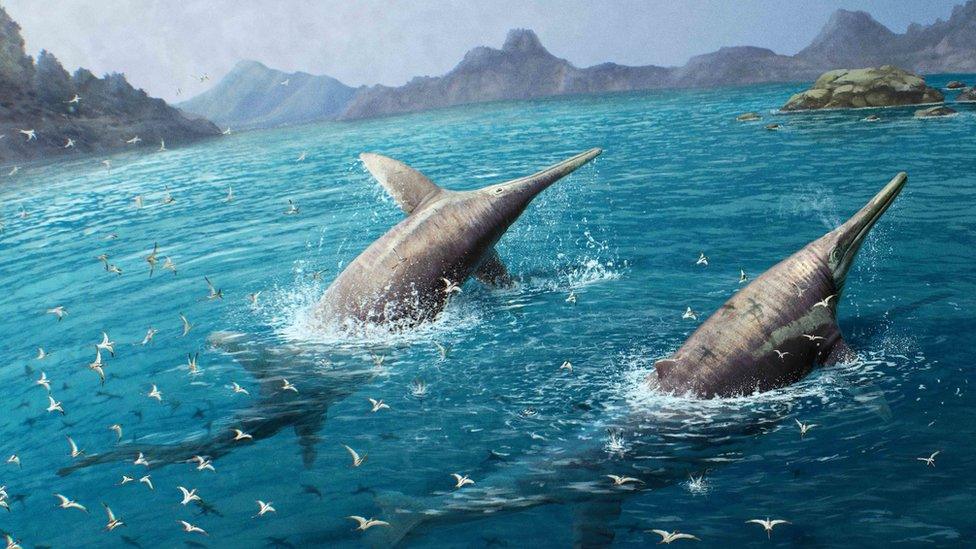Schoolgirl discovers fossil of huge prehistoric sea reptile
- Published
- comments

The marine reptile is believed to have lived in the oceans 202 million years ago
A fossil found by an 11-year-old girl in the UK has led to the discovery of what may be the largest marine reptile ever to have lived.
Ruby Reynolds was 11 when she discovered the first pieces of the sea reptiles jaw bone whilst walking on a beach in Somerset in May 2020.
The bones belonged to a prehistoric sea reptile - called an ichthyosaur - that is as long as two buses.
It is thought to have lived 202 million years ago at the same time as dinosaurs.
Ruby and her dad joined the team of scientists to discover more pieces of the jaw
Since finding the first piece, Ruby and her dad were invited to joined a team of scientists who have now discovered more pieces of the jaw that fit together perfectly.
The last piece was found in October 2022.
The team named the creature Ichthyotitan severnensis, which means giant fish lizard of the Severn.
Ruby, who is now 15, was a co-author of the paper about the findings - making her a published scientist!
It is even hoped that one day the specimen she found may be named Ruby.
The Ichthyotitan severnensis lived at the same time as dinosaurs
Dr Dean Lomax, a scientist on the team, said: "I was highly impressed that Ruby and Justin (Ruby's Dad) correctly identified the discovery as another enormous jawbone from an ichthyosaur.
"I asked them whether they would like to join my team to study and describe this fossil, including naming it.
"She (Ruby) is now a published scientist who not only found but also helped to name a type of gigantic prehistoric reptile. There are probably not many 15-year-olds who can say that."
Ruby said: "It was so cool to discover part of this gigantic ichthyosaur. I am very proud to have played a part in a scientific discovery like this."
The newly-discovered jawbone fossils (at the top) dwarf the same bones from orca-sized animals (at the bottom)
The giant ichthyosaur died out in a mass extinction and the ichthyosaurs that lived after that never reached the enormous size again, according to Dean.
The specimen will soon go on public display at the Bristol Museum and Art Gallery.
Dean says the discovery highlights how important amateur fossil collectors are.
"Families and all sorts of people can make amazing discoveries You don't have to be a world expert. As long as you have that bit of patience and a keen eye, you can make a discovery," he says.
- Published3 September 2021
- Published12 August 2020
- Published1 March 2012
